
I’m hard of hearing, and my best friend’s completely deaf. We were at a café, chatting in sign language, when an entitled mom demanded we stop signing, saying it was “disruptive” and “inappropriate.” The entire café paused when a waiter stepped in and reminded her what inclusion really means.
I’m Dottie, 22 years old, and I’ve been hard of hearing since the day I took my first breath. Growing up meant learning to dance between two worlds — the hearing world that expected me to read lips and speak clearly, and the deaf world where my hands could sing stories faster than my voice ever could.
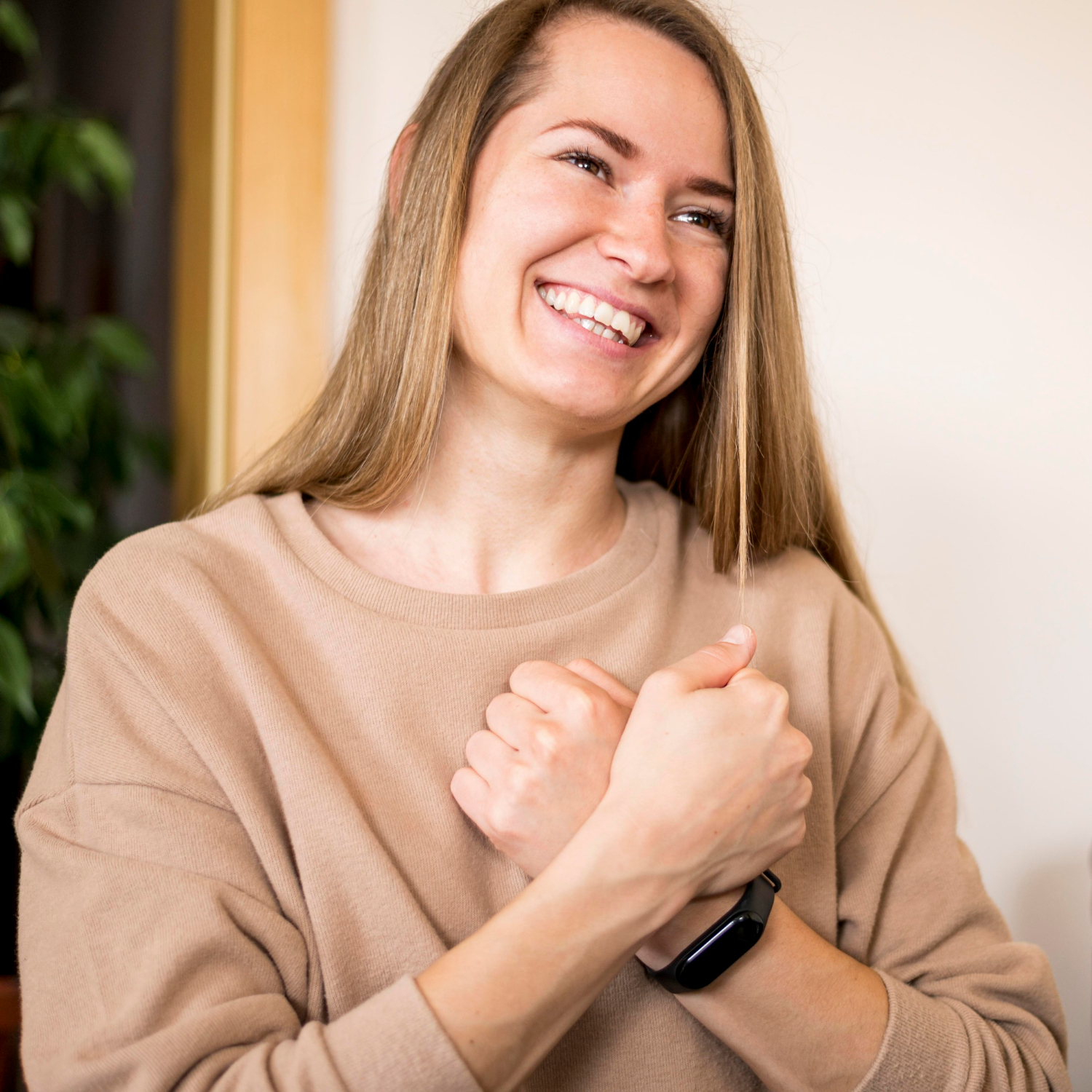
A cheerful woman communicating through sign language | Source: Freepik
Most days, I barely notice the stares anymore. I don’t care about the whispers. But that day wasn’t most days.
“Maya’s already inside,” I muttered to myself, pushing through the glass doors of Rosewood Café, our usual Tuesday spot.
The familiar smell of cinnamon and fresh bread wrapped around me like a warm hug, and I spotted my best friend immediately, her wavy hair bouncing as she laughed at something on her phone.
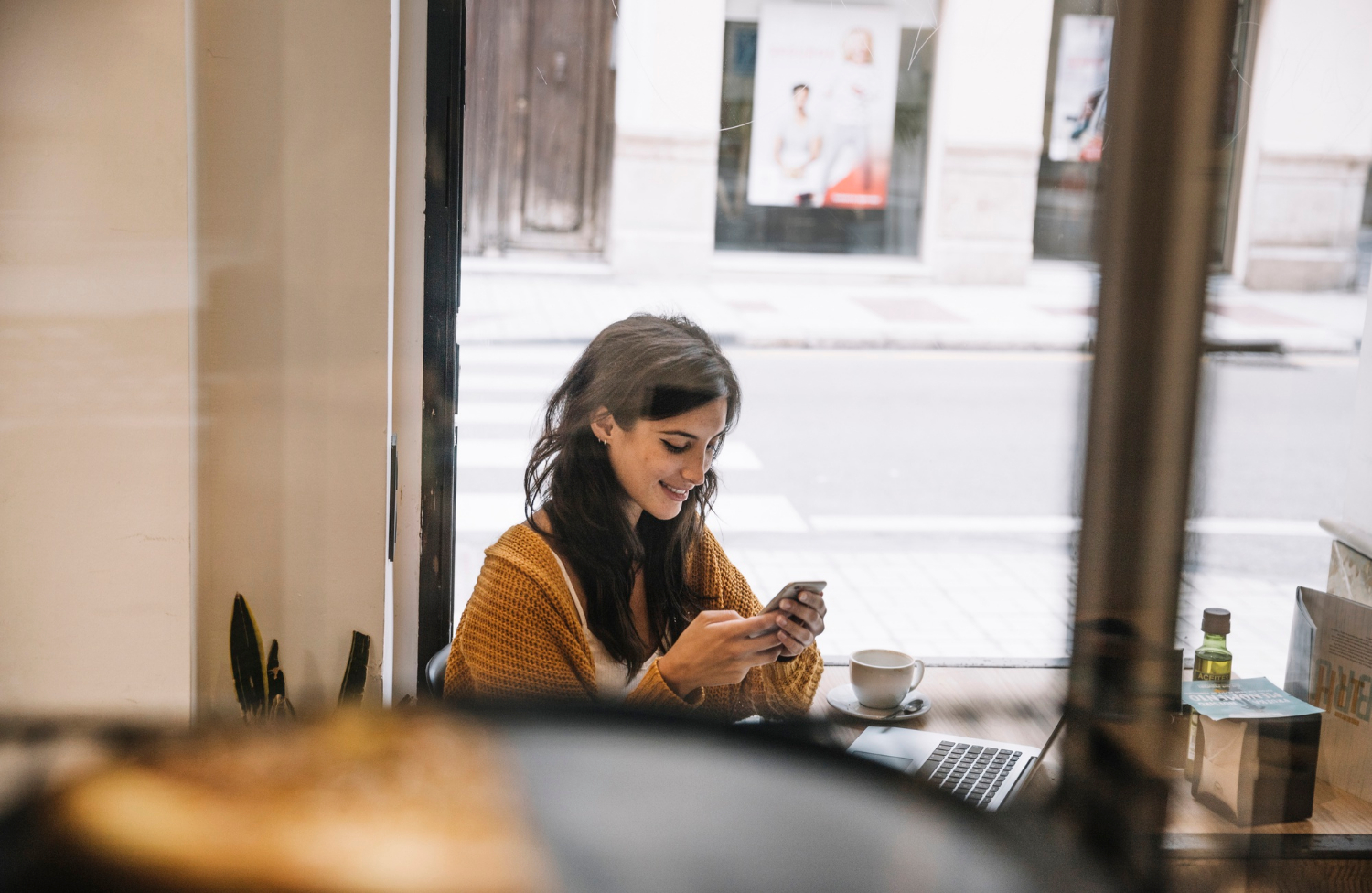
A woman looking at her phone and smiling | Source: Freepik
Unlike me, Maya can’t hear anything, not even muffled sounds or background noise. She’s completely deaf and uses only sign language to communicate.
But that’s never been a barrier between us. Not once in the seven years we’ve been glued at the hip. If anything, it’s made our friendship stronger and deeper.
We’ve had whole conversations in crowded rooms without saying a word, laughing until our stomachs hurt, while everyone else wondered what was so funny.

Two women communicating through sign language | Source: Freepik
Maya looked up as I approached, her face lighting up. She signed with a dramatic flourish and said, “Finally! I was starting to think you’d chickened out on me.”
“Traffic was insane,” I signed back, settling into the worn leather chair across from her. “Plus, Mrs. Henderson cornered me about the community garden again.”
“That woman needs a hobby that doesn’t involve interrogating 20-somethings about composting!” Maya replied, her hands dancing through the air with practiced grace.
We fell into our usual rhythm — signing, laughing, and occasionally speaking aloud when the mood struck us.
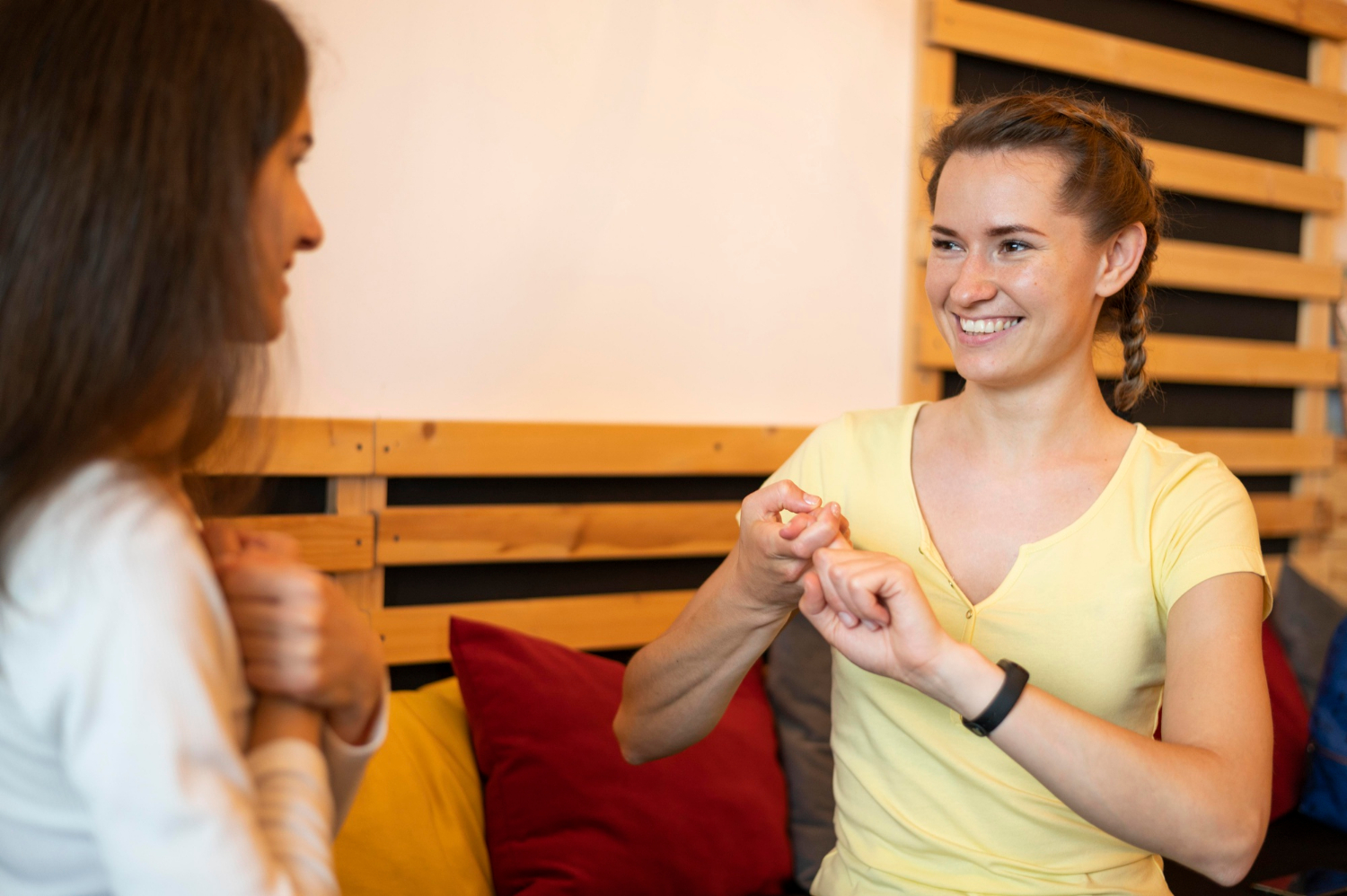
A delighted woman making hand gestures to her friend | Source: Freepik
Maya was telling me about her disastrous attempt at making sourdough starter when I noticed a curious little boy, maybe seven or eight, sitting three tables over with his mother.
His eyes were wide, watching our conversation with the kind of innocent curiosity that children have before the world teaches them to look away.
I smiled at him and signed a simple “hello!” His face broke into a grin, and he wiggled his fingers back in what might have been an attempt at signing.
“That’s adorable,” Maya signed, noticing the exchange. “He’s trying to copy us.”

A little boy drinking from a ceramic cup while staring curiously | Source: Freepik
The boy’s mother, however, was not amused. She had been typing furiously on her phone. When she looked up and saw her son’s enthusiastic finger wiggling, her expression soured like milk left in the sun.
“Stop it!” she hissed at her son, grabbing his hands and forcing them down. “We don’t do that.”
Maya and I exchanged glances. We’d seen this before… the discomfort, quick corrections, and how some parents treated sign language like it was contagious.
But usually, people just looked away. This woman was different. She kept shooting glances our way, her jaw tightening with each passing moment.

An annoyed woman staring unkindly | Source: Pexels
“Should we go somewhere else?” Maya asked, her hands moving smaller now, her voice low and hurt.
“Absolutely not,” I replied, my movements deliberate and proud. “We have every right to be here.”
But even as I said it, I felt that familiar knot forming in my stomach… the one that appeared whenever I had to defend my existence when someone made me feel like I was asking for too much simply by being myself.

A person showing a thumbs up | Source: Freepik
The boy’s mother stood up abruptly, her chair scraping against the floor with an awful screech. She marched over to our table, her son trailing behind her with his head down, embarrassment radiating from his small frame.
“Excuse me,” she said, her voice dripping with the kind of false politeness that barely concealed irritation. “Could you please stop doing… that?”
I blinked at her, trying to make sure I caught that right. “Doing what, exactly?”
“The hand gestures. The waving around. My son is trying to eat his lunch, and you’re being incredibly distracting.”

A furious woman yelling | Source: Pexels
The words landed hard, like a door slammed in my face. Maya’s hands froze mid-sign, and I could see the edge in her eyes that always came when someone crossed a line.
“You mean sign language?” I asked.
“I don’t care what you call it!” the entitled mother snapped. “It’s disruptive. And frankly, it looks aggressive. My child shouldn’t have to witness this kind of… display while he’s trying to learn proper table manners.”
The café grew quiet around us. Conversations stopped mid-sentence, and coffee cups paused halfway to lips.
I could feel every pair of eyes in the room, and for a moment, I was eight years old again, standing in front of my third-grade class while my teacher explained to the other children why I was “different.”

A sad little girl sitting in her classroom | Source: Pexels
“Actually,” I said, my voice finding strength I didn’t know I had, “this might be a perfect opportunity to teach your son that people communicate in different ways. It’s a beautiful lesson in diversity.”
She let out a harsh laugh that made me flinch. “Oh, please! Spare me the political correctness lecture. This is exactly what’s wrong with society today! Everyone wanting to be special, everyone demanding attention. It’s selfish!”
Maya’s face had gone pale, her usual confidence shaken. Though she couldn’t hear anything, she understood. I reached across the table and took her hand, squeezing it gently.

Two women holding their hands | Source: Freepik
“There’s nothing selfish about existing,” I turned to the woman.
“Existing?” Her voice rose an octave. “Is that what you call all that frantic gesturing? It looks like you’re casting spells or something. It’s weird and inappropriate, and I shouldn’t have to explain to my son why grown women are sitting in a public place making a spectacle of themselves.”
Her son tugged on her sleeve. “Mom, please—”
“Not now, Tyler,” she snapped, not taking her eyes off us.

A worried boy | Source: Freepik
That’s when I noticed him approaching from the corner of my eye. James, one of the regular waiters, was walking toward us with a coffee pot in one hand and the kind of determined expression that suggested he’d heard enough.
“Is everything okay over here?” he asked, his voice calm but carrying an undertone that made the woman’s posture stiffen.
“Actually, no!” she said, turning her attention to him. “These two have been making a scene with their hand gestures, and it’s disturbing other customers. I think you should ask them to stop or find somewhere more appropriate for their… activities.”
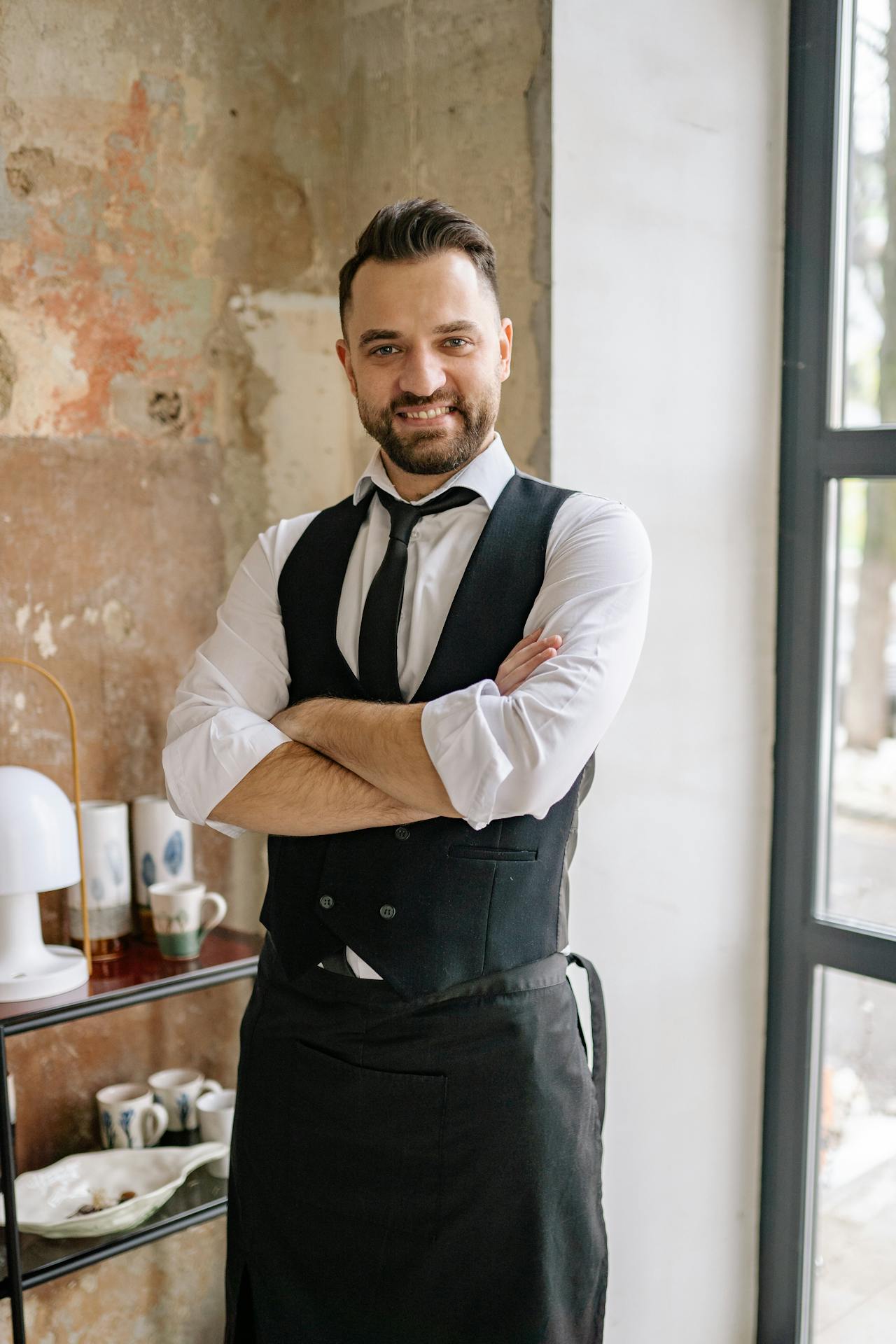
A waiter smiling | Source: Pexels
James set down the coffee pot and looked directly at her, his expression never changing. “Ma’am, I’ve been watching this entire interaction, and the only person causing a disturbance is YOU.”
The woman’s mouth fell open. “Excuse me?”
“Sign language isn’t disruptive,” James continued. “It’s a legitimate form of communication used by millions of people. What is disruptive is someone harassing customers for the crime of having a conversation.”
I felt tears prick at the corners of my eyes, but for once, they weren’t tears of frustration or hurt. They were tears of gratitude and relief at being defended by someone who understood.

An emotional woman with teary eyes | Source: Pexels
“Now,” James said, turning to Maya and me with a genuine smile, “can I interest you ladies in our chocolate chip cookies? They just came out of the oven, and they’re on the house today.”
The woman’s face had turned a mottled red. “This is outrageous. You can’t just—”
“Actually, I can,” James interrupted gently. “This café believes in treating all customers with respect and dignity. We don’t tolerate discrimination in any form.”
A soft round of applause started from a table near the window, spreading through the café like ripples on water. The woman looked around wildly, realizing that the room wasn’t on her side.
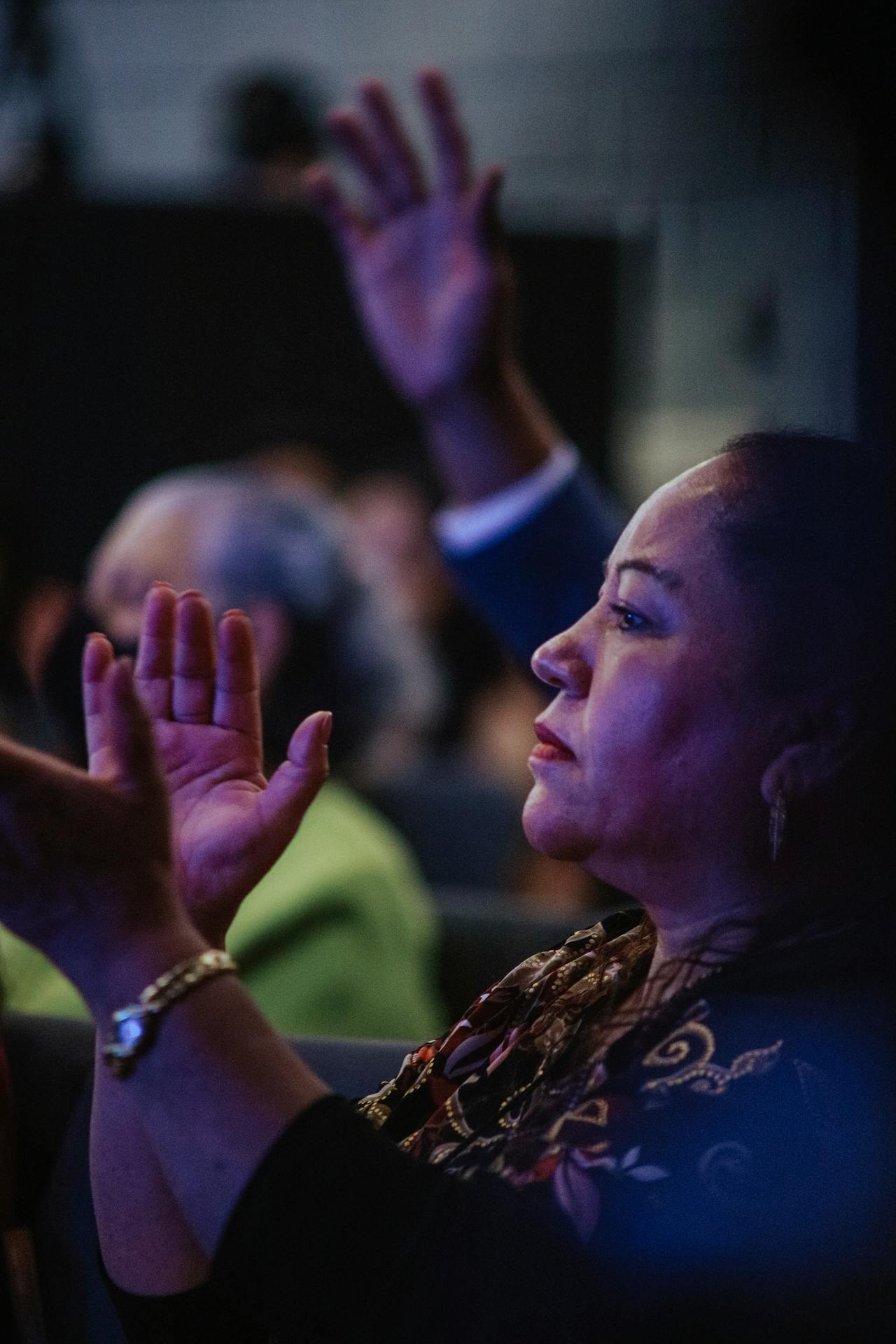
A woman clapping her hands | Source: Pexels
“Come on, Tyler,” she muttered, grabbing her purse. “We’re leaving.”
But Tyler didn’t move immediately. Instead, he looked up at his mother with the kind of clarity that children sometimes possess, cutting through adult nonsense with startling precision.
“Mom, why were you being mean to them? They weren’t hurting anyone.”
“Get your jacket,” she hissed, but Tyler was already walking toward our table.

A frustrated woman | Source: Pexels
He stopped a few feet away, looking nervous but determined. Then, slowly and carefully, he raised his hand and signed “I’m sorry” in perfect ASL.
Maya’s face lit up, and she signed back, “Thank you, sweetheart. You did nothing wrong.”
Tyler beamed, and before his mother could drag him away, he added, “Can you teach me how to say ‘friend’?”
“Like this,” Maya showed him, her hands gentle and patient.
Tyler copied the movement, his face serious with concentration. “Friend!” he whispered, practicing the sign.
His mother finally reached him, her grip tight on his arm. “We’re leaving. Now.”

Close-up shot of a person making a hand gesture | Source: Freepik
As they headed toward the door, Tyler turned back one more time and signed “friend” to us, his smile bright despite his mother’s obvious anger. Maya and I waved back, and I felt something shift inside my chest — a loosening of that familiar knot, replaced by something warmer and stronger.
James returned with a plate of cookies that smelled like heaven and tasted like justice. “I’m sorry you had to deal with that,” he said as he set them down. “Some people just don’t understand that different doesn’t mean wrong.”
“Thank you,” I said, my eyes misty. “You didn’t have to do that.”
“Actually, I did,” he replied, his smile sad but genuine. “My brother is deaf. I know what it’s like to watch people treat someone you love like they’re less than human just because they communicate differently.”

A man with his hand placed behind his ear | Source: Pexels
Maya reached across the table and squeezed my hand. “You okay?”
I nodded. “Yeah, I am.”
We sat there for another hour, signing and laughing and sharing those perfect cookies. Other customers smiled at us as they passed our table, and one elderly woman even stopped to tell us how beautiful sign language looked.
As we prepared to leave, I thought about Tyler and his bright, curious eyes. I thought about his mother and wondered what had happened in her life to make her so afraid of difference.
But mostly, I thought about the choice we all have: to build bridges or walls, to teach fear or wonder, and to see disability as a limitation or simply as another way of being human… and normal.

A cheerful woman making a hand gesture | Source: Freepik
“Same time next week?” Maya asked as we gathered our things.
“Wouldn’t miss it!” I replied, my hands moving with pride, joy, and absolutely zero shame.
Walking out into the afternoon sunshine, I realized that some days really do start ordinary and end extraordinary… not because of grand gestures or dramatic moments, but because of small acts of kindness and the simple truth that we all deserve to exist exactly as we are.
And sometimes, the world reminds you that you’re not alone in believing that!
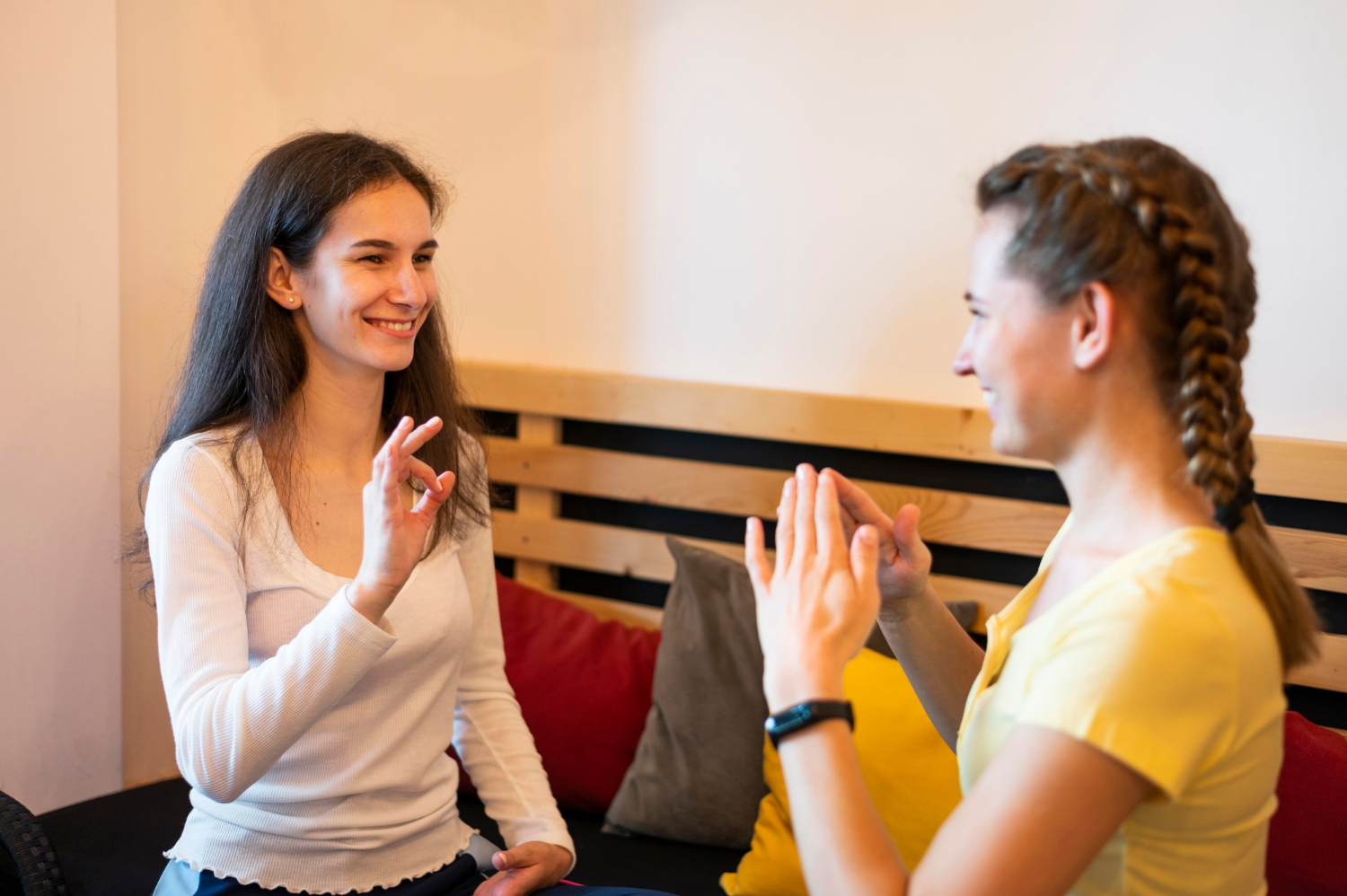
Two happy women communicating to each other through sign language | Source: Freepik
Here’s another story: Erin boards a five-hour flight with her restless toddler, prepared for anything but the entitled man in front of them. What unfolds is a clash, a choice, and a moment she’ll never forget.
This work is inspired by real events and people, but it has been fictionalized for creative purposes. Names, characters, and details have been changed to protect privacy and enhance the narrative. Any resemblance to actual persons, living or dead, or actual events is purely coincidental and not intended by the author.
The author and publisher make no claims to the accuracy of events or the portrayal of characters and are not liable for any misinterpretation. This story is provided “as is,” and any opinions expressed are those of the characters and do not reflect the views of the author or publisher.
Để lại một phản hồi